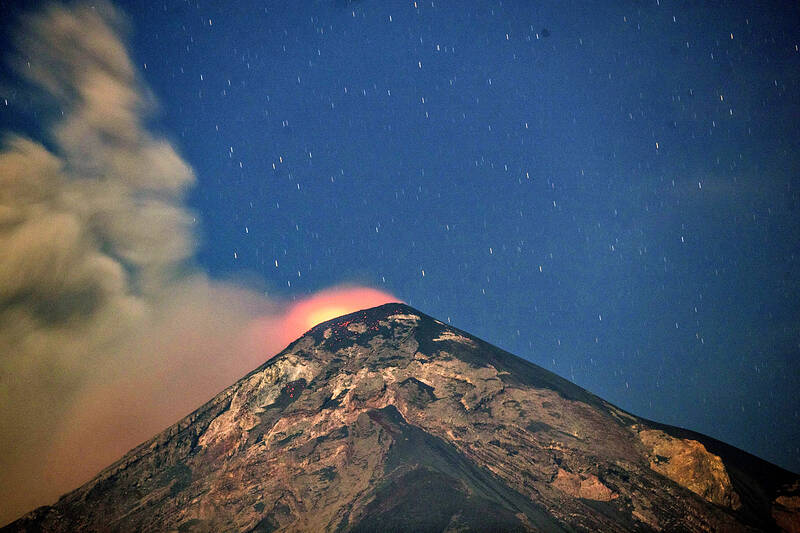Guatemalan authorities evacuated more than 1,000 people and closed a road as Central America’s most active volcano erupted on Thursday, spewing thick clouds of ash over farms and towns not far from the capital city.
Civil protection official Oscar Cossio said 1,054 people had been evacuated from five communities near the foot of the volcano, and moved to a sports hall for shelter.
He said that the number was likely to rise as a full accounting of the evacuees was carried out.

Photo: EPA-EFE
Guatemala’s Conred disaster center said the volcano named Fuego, Spanish for “fire,” was sending out a high-temperature mix of gas, ash and rock fragments that “descend with great speed down the flanks of the volcanic complex.”
The ash column ejected by Fuego reached more than 6,000m above sea level.
Conred said ash was falling to the west and southwest of the volcano, in a direction away from the capital Guatemala City, which is 22km to the northeast.
Stronger emissions could follow as the “high level” eruption continues, and said that mudslides could form with rainfall forecast.
Conred official Rodolfo Garcia estimated that 130,000 people live within areas exposed to falling ash, which came down as far as 100km from the crater.
He said 13 emergency shelters had opened in four nearby towns, capable of providing refuge to 7,600 people. The authorities opted to close the RN-14 route on the slopes of the volcano that connects several towns to the colonial city of Antigua, the country’s main tourist attraction and a UNESCO World Heritage site.
It advised those living in areas at risk of the ash cloud to carefully follow any instruction from the authorities, and urged locals and tourists to avoid a restricted area of 7km around the volcano.
Residents were advised to cover water tanks to avoid contamination, wear masks so as not to breath in the ash, clear fallen debris from the roofs of their homes to prevent damage caused by heavy deposits, and have evacuation survival kits ready for themselves and their pets.
Police released photos showing automobiles and motorcycles stopped along highways to avoid being bogged down in fallen ash.
An eruption of lava and ash by the same volcano in December last year forced Guatemalan authorities to temporarily close the country’s largest airport.
The 3,763m tall volcano erupts every four to five years.
In 2018, an eruption sent rivers of lava pouring down its sides, devastating the village of San Miguel Los Lotes, killing 215 people and leaving a similar number missing.
Guatemala has two other active volcanoes — Santiaguito in the west of the country and Pacaya in the south.

With much pomp and circumstance, Cairo is today to inaugurate the long-awaited Grand Egyptian Museum (GEM), widely presented as the crowning jewel on authorities’ efforts to overhaul the country’s vital tourism industry. With a panoramic view of the Giza pyramids plateau, the museum houses thousands of artifacts spanning more than 5,000 years of Egyptian antiquity at a whopping cost of more than US$1 billion. More than two decades in the making, the ultra-modern museum anticipates 5 million visitors annually, with never-before-seen relics on display. In the run-up to the grand opening, Egyptian media and official statements have hailed the “historic moment,” describing the

‘CHILD PORNOGRAPHY’: The doll on Shein’s Web site measure about 80cm in height, and it was holding a teddy bear in a photo published by a daily newspaper France’s anti-fraud unit on Saturday said it had reported Asian e-commerce giant Shein (希音) for selling what it described as “sex dolls with a childlike appearance.” The French Directorate General for Competition, Consumer Affairs and Fraud Control (DGCCRF) said in a statement that the “description and categorization” of the items on Shein’s Web site “make it difficult to doubt the child pornography nature of the content.” Shortly after the statement, Shein announced that the dolls in question had been withdrawn from its platform and that it had launched an internal inquiry. On its Web site, Le Parisien daily published a

China’s Shenzhou-20 crewed spacecraft has delayed its return mission to Earth after the vessel was possibly hit by tiny bits of space debris, the country’s human spaceflight agency said yesterday, an unusual situation that could disrupt the operation of the country’s space station Tiangong. An impact analysis and risk assessment are underway, the China Manned Space Agency (CMSA) said in a statement, without providing a new schedule for the return mission, which was originally set to land in northern China yesterday. The delay highlights the danger to space travel posed by increasing amounts of debris, such as discarded launch vehicles or vessel

RUBBER STAMP? The latest legislative session was the most productive in the number of bills passed, but critics attributed it to a lack of dissenting voices On their last day at work, Hong Kong’s lawmakers — the first batch chosen under Beijing’s mantra of “patriots administering Hong Kong” — posed for group pictures, celebrating a job well done after four years of opposition-free politics. However, despite their smiles, about one-third of the Legislative Council will not seek another term in next month’s election, with the self-described non-establishment figure Tik Chi-yuen (狄志遠) being among those bowing out. “It used to be that [the legislature] had the benefit of free expression... Now it is more uniform. There are multiple voices, but they are not diverse enough,” Tik said, comparing it